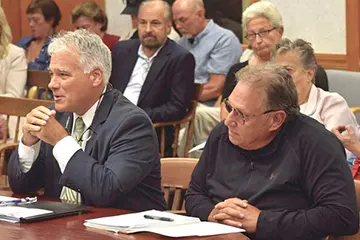 On Wednesday, the Conway Zoning Board of Adjustment was expected to decide on the proposed Conway Poker Room & Casino. But board members agreed to postpone the decision to September 20, when another meeting will take place, as reported by media agency The Conway Daily Sun.
On Wednesday, the Conway Zoning Board of Adjustment was expected to decide on the proposed Conway Poker Room & Casino. But board members agreed to postpone the decision to September 20, when another meeting will take place, as reported by media agency The Conway Daily Sun.
Deputy Town Manager Paul DegliAngeli was absent during the board’s discussion of the casino’s appeal of a decision taken by Deputy Town Manager Paul DegliAngeli to deny a zoning permit to the casino. Attorney John Cronin of Cronin, Bisson & Zalinsky of Manchester, and developer Dick Anagnost made a presentation and answered questions. Casino partner Stefan Huba was present but did not speak. Spokeswoman Tiffany Eddy provided figures on the amount gaming has contributed to charitable organizations. The town’s legal counsel Jason Dennis was also absent.
Board member Jon Hebert decided to put off the decision until September 20 because he wanted to ask Dennis several questions. Another reason for the board’s decision to postpone the decision was the number of supporting documents filed by the developer at the last minute. Mr. Hebert explained that he listened to the presentation carefully and needed time to assimilate the information and find answers to some questions.
More about the Proposed Charitable Gaming Facility in Conway, New Hampshire
Purchased by Anagnost last year, the proposed facility in Shur-fine Plaza in Conway would occupy 12,000 square feet and function primarily as a bar and restaurant. However, approximately one-third of the space would be used for table games such as poker and horse racing machines.
Of the gaming revenue the facility would generate, 35% would be directed towards charities, while 10% would go to the state’s education fund. The remaining portion would go to the casino operator. Revenue from the restaurant and bar would be handled separately.
In his 67-page appeal to the town, Cronin emphasized that the casino project had obtained two building permits, but one expired during the COVID pandemic. He also noted the developer had already invested $500,000 worth of work in the project before the town withdrew the second permit and DegliAngeli denied the zoning permit.
Cronin mentioned that the facility’s gaming area would only occupy 4,000 square feet, making it significantly smaller than any Las Vegas-style casino. Anagnost said that the facility would be subject to strict regulation and prioritize support for local charities. He added that players would be allowed to wager no more than $50 and that the majority of people who visit such establishments are between 42 and 70 years old.
The Proposed Gaming Venue Becomes Main Point of Contention
The proposed gambling facility, however, stirred up controversy among town officials and locals. During public comment, critics expressed concerns that a casino would negatively impact the town’s identity. Quddus Snyder, who protested outside, warned against the disadvantages of having a casino in Conway.
On the other hand, proponents said that the casino would benefit local charities. Janice Crawford, the former executive director of the Chamber of Commerce, explained that non-profits could receive significant amounts of money from charitable gaming. Snyder, who operates a chimney sweep service, responded that a casino is not necessary to support non-profits because many local businesses, including his own, also contribute to charitable causes.
Most speakers at the meeting opposed the casino proposal, arguing that the gaming facility would have a negative impact on the quality of life. The zoning board’s main concern was whether to support DegliAngeli’s decision to deny the casino’s zoning permit. DegliAngeli refused the developer a casino license because he believed that casino games did not fit the town’s definition of indoor amusement.
Town Planner Ryan O’Connor explained that the state charitable gaming laws were implemented after the town ordinance was passed. That is why commercial amusements were seen as arcades, billiards, and bowling. Although Selectman Ryan Shepard expressed his trust in DegliAngeli’s judgment, he praised the casino applicants for fearlessly facing the opposition at the meeting.